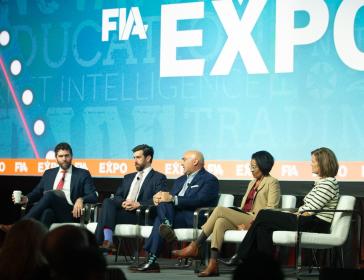Amid the Trump Administration’s breakneck pace of announcing Cabinet nominees, FIA Expo’s panel, Inside the Beltway: The Impact of the Election, drew strong interest. The speakers shared their expertise on the details of the CFTC leadership change, what the new Congress might tackle first, the likelihood of action on crypto legislation and the future of prediction markets.
The CFTC
Kevin Batteh, partner and general counsel with Delta Strategy Group, walked attendees through the chairmanship handover process at the Commodity Futures Trading Commission.
Given the change in political party at the White House, Batteh shared that typically, the current chair will step down and then the commissioners vote on who will serve as acting chair. Occasionally, the new administration will weigh in with a preference and the commission will follow that guidance.
As for who will helm the commission permanently, De'Ana Dow, partner and general counsel at Capitol Counsel, suggested the prominence of crypto in the presidential election will help move the CFTC chair closer to the top of the to-do list for the president’s transition team.
Karen Wuertz, senior vice president of external affairs and communications at the National Futures Association, shared that the president’s nominee may not have a traditional background in futures and derivatives markets. She highlighted how the industry will need to step up its education efforts during the onboarding process, both with any new commissioners and staff at the CFTC.
From a policy perspective, Batteh does not expect the CFTC to push out many, if any, new rules before the end of the year. He also noted the acting chair likely would bring a constrained approach – partially out of respect while awaiting a confirmation hearing for the president’s nominee and also due to the difficulty in hiring staff, given the potential temporary nature of the acting position.
The Congress
Turning to the legislative branch, Paul Balzano, a professional staff member of the US House Committee on Agriculture for the majority, shared his experiences about congressional transitions and what to expect from new members.
Despite the agriculture committees’ role in overseeing the CFTC, Balzano noted most members of Congress join the committee to focus on rural and agriculture-related issues. He amplified Wuertz’ comments that education will be key for new members and their staff.
Balzano also expects some turnover on the House Agriculture Committee, with some retirements and other members moving to other committees. In the Senate, Committee Chair Debbie Stabenow retires at the end of this Congress, making Minnesota Senator Amy Klobuchar the likely new ranking member. Arizona Senator John Boozman will take over as chair, with the Republicans retaking the majority in the upper chamber.
Overall, between both chambers, Balzano said many of the experienced members of the committees would remain active on the committee.
Looking at legislative actions Republicans might take in the new Congress, Batteh suggested the new majority might enlist the Congressional Review Act to help overturn regulations that took effect during the final months of the Biden Administration.
While not a legislative tool used often before the first Trump Administration, he expects Republicans to bring it back to the fore. Notably, it requires both chambers of Congress to pass it and the president to sign it. With Republican control in all three places, it dramatically increases the chances of its use. And Dow added that once Congress overturns a regulation, the agency cannot repropose it, effectively ending that regulatory act permanently.
On the topic of legislation, the panel said crypto legislation would have a strong chance of passing sooner rather than later. In particular, President-elect Trump has suggested his administration will prioritize providing regulatory clarity for crypto.
Balzano noted his boss, House Agriculture Chair G.T. Thompson, feels strongly in providing that regulatory clarity for the digital asset markets. Legislation likely would clarify questions around market structure, too.
Wuertz shared how that clarity would come into effect, in practical terms. Notably, she highlighted how NFA’s mission to ensure safe markets and strong market integrity brings a strong focus on “getting it right the first time.” This requires creating a staff advisory committee that will ensure investor protections resonate throughout implementation.
The prediction markets
Given the prominent role prediction markets played in more accurately predicting the election – and the 200 million contracts that occurred in the last week on just one exchange – the panel recognized the role these markets will play going forward.
Balzano noted many members of the House Agriculture Committee have strong curiosity about the markets, largely due to the press coverage they earned.
Wuertz noted NFA is agnostic with products, and that the rulebook on retail markets has existed for decades. However, with any new product, NFA must weigh the need for new investor protections.
Dow noted Congress “has spoken” and that they permit event contracts, except ones not in the public interest. Those would include ones related to war and terrorism, for example. And she suggested the CFTC and the NFA have the necessary authority to handle event contracts going forward, without Congress action. An option with which Batteh agreed.


